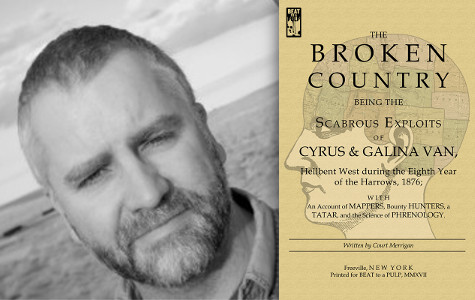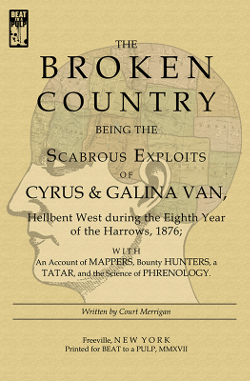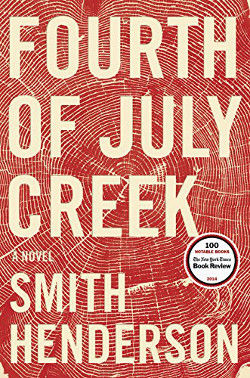
Court Merrigan describes himself as a farm-raised country boy, recovering expat, teacher, and businessman. He lives in Wyoming with his family and has an alternate history Western novel just released from BEAT to a PULP books with a Crusoe-inspired title: The Broken Country: Being the Scabrous Exploits of Cyrus & Galina Van, Hellbent West during the Eighth Year of the Harrows, 1876; With an Account of Mappers, Bounty Hunters, a Tatar, and the Science of Phrenology.
Editor and publisher of BTAP caught up with Mr. Merrigan on the virtual country trail to ask a few questions.
 What is The Broken Country about, Court?
What is The Broken Country about, Court?
The Broken Country is a gumbo. A mutt in book form. I mean, Westerns are fantastic, but am I going to improve on The Searchers? No. And Blade Runner is life. Can I better that? Nope. Love outlaw stories, but can I do better than Bonnie & Clyde? No chance. Neo-Biblical Cormac McCarthy-like rumblings, the 19th-century pseudo-science of phrenology, the agitprop of Manifest Destiny, itinerant preachers and revivalist Buddhists … I wondered, how can I squeeze all that into one book and still tell an entertaining tale?
I gave it my best shot, and The Broken Country is the result. It’s got all of the above, and I hope it becomes something new and more and original in the process.
Cyrus and Galina are two of the most amoral creatures I’ve read about in some time. Where was the inspiration there?
They weren’t raised right! Naw, I mean, The Broken Country takes place in hard times—the hardest I could think of. Cyrus and Galina are only doing what they feel they have to. And being Americans, what they feel they have to do is stake their claim and get ahead. Even in the hardest of hard times.
The Broken Country is described as a post-apocalyptic Western set in 1876. Are there relatable characters, situations that readers can identify with today?
I saw on Twitter today that 47% of Americans now worry about hunger and homelessness. Forty-seven percent! In America, richest cornucopia in history, in 2017! From time to time, the world bares its teeth and reminds us that we’re barely a blink away from the jungle, red in tooth and claw. The Broken Country pulls back our civilized facade as far as I could stretch it and still have six-guns with bullets that still shoot.
Neo-Biblical Cormac McCarthy-like rumblings, the 19th-century pseudo-science of phrenology, the agitprop of Manifest Destiny, itinerant preachers and revivalist Buddhists … I wondered, how can I squeeze all that into one book and still tell an entertaining tale?
Then again, why try to relate? Neither you or I or anyone else we know could be as wanton and brutal as Cyrus and Galina. We should be glad about that. Until the End Times hit, anyway.
How do you begin a novel? Any specific entry, an image that you’ve seen?
I agree with the master Cormac McCarthy: “The ugly fact is books are made out of books.” But let’s not be too hifalutin here: I’m pretty sure my first inspiration for the outlaw Cyrus came from the cowboy comics I devoured as a kid (sure wish I’d kept some of them…), y’know, the ones with the cowboy’s speech bubble at one corner of his mouth, a cigarillo in the other, smoke drifting over crumpled bodies in the saloon. I always liked those amoral characters, the ones for whom gunsmoke and moral compromise were a way of life. Probably why I didn’t last in the Boy Scouts.
For years I wanted to write a story that began with “The man in black walked into the saloon…” I just wanted to dispense with the conventions and tropes that usually follow. In The Broken Country, I hope I succeeded.
You mention Cormac McCarthy. Can you talk about the influence of other writers on your work?
When I finished the original draft of The Broken Country nine years ago, I was also heavily under the influence of McCarthy’s masters, Faulkner and Hemingway. But then the draft sat on a hard drive for a number of years because it didn’t feel done.

In the meantime, I discovered the glorious worlds of crime and pulp fiction and my particular favorite subgenre, country noir. Harry Crews, James Crumley, and Flannery O’Connor are my idols among the dead. And among the living: Kiss Me, Judas by Will Christopher Baer is criminally unknown. The great Japanese noirist Kenzo Kitakata’s The Cage is my go-to mob book (the yakuza, in this case). Smith Henderson’s inimitable portrait of hardscrabble rural Montana in Fourth of July Creek is the best book I’ve read in a decade. Frank Bill’s Crimes in Southern Indiana changed everything I’d ever thought about crime fiction. Paolo Bacigalupi’s wondrous Thailand in The Windup Girl is a master class in just how fantastical you can get with the pre-existing world. Percival Everett’s morbidly comic God’s Country blazed the trail for my thinking on how to turn Western tropes on their head.
The other huge influence on The Broken Country was the unlikely sounding The Sovereignty and Goodness of God, written by the devout Puritan Mary Rowlandson in 1682. The woman was hauled off by Indian warriors into the wilderness, man, after they burned down her whole town! What happens when you go trespassing into the ancestral lands of a proud people, I guess, but she came back and told the tale in fine fashion. Galina is definitely Mary Rowlandson’s ancestor.
I’m also indebted to the great historian Francis Jennings, whose grim portraits of American history surely helped me paint the Old West a darker shade of black.
You live in picturesque Wyoming, does that weave its way into your creative process?
Actually, the first drafts were written when I was living in Thailand. The Broken Country is really a fever dream born of envisioning wide Wyoming skies and vaguely remembering elementary school textbooks while living in the tropics.
On Twitter, your bio reads “recovering expat.” There must be a story there.
I lived in Japan and Thailand for a decade in my 20s. You start to see things funny when you’ve been so far gone from home for so long. At least, if you ever want to come back home. I’d never really functioned as an adult in America until I was 33 years old, four years after I got married, two after my daughter was born. The first year or two I was back from overseas, everything seemed muffled in cotton-candy fuzz. I had no idea what I was doing. I didn’t understand how mortgages worked, taxes, health insurance, or proper resumes. It was like I’d suddenly awakened from a fugue state and stood naked in the frozen food aisle of a Hi-Lo Market in Albuquerque.
Turns out it takes you a while to recover from being an expat and turn yourself into a fully functioning adult. Still a work in progress.
Do you need complete isolation to work?
Once upon a time, my friend. Once upon a time. Then 9 years ago my wife brought forth a squirming baloney loaf of squalling need, and I’ve been writing in the cracks and early-morning/late-night silence ever since. I’ve gotten pretty good at writing in short spaces and time frames.
What’s next? Any other novels on the horizon?
Oh, yes. Neck-deep in a novel right now about two sisters on the run. And I have several novels living on Dropbox, hoping for the same salvation The Broken Country received.
However, I’ve also got two young children to finish raising, a day job, and a couple businesses to keep afloat. I inherited a workhorse mentality from a long line of toiling ancestors. Remember Boxer from Animal Farm? “I will work harder”? That’s me. Everyone says you should focus, and they’re probably right, but I keep my focus on keeping 7 or 8 balls in the air at once. Besides, I clawed back several square miles of mental space just by swearing off social media before noon (when I keep to it, that is) and doing my best to stay grounded in meatspace. I hope my next novel reflects that.
To learn more or order a copy, visit:
Court Merrigan is a farm-raised country boy, recovering expat, teacher, and businessman. Author of the short story collection Moondog Over the Mekong (Snubnose), he lives in Wyoming with his family.
David Cranmer is the publisher and editor of BEAT to a PULP. Latest books from this indie powerhouse include the alternate history novella Leviathan and sci-fi adventure Pale Mars. David lives in New York with his wife and daughter.

Good interview. Better book, IMO. You’d be damned stupid to pass it up.
Good interview. Always enjoy reading about other writer’s influences. McCarthy is a good one to have.
Thanks for your enthusiasm, [b]Brad[/b].
[b]cgramlich[/b], I have the same curiosity. Never get tired of reading how others navigate the process.